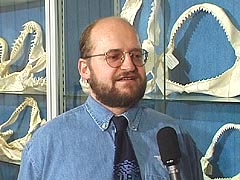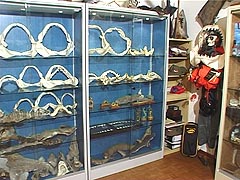The Shark Tooth Maven
An exclusive interview with Joe
Herber, a fervent amateur shark naturalist from Luxembourg. Interview
conducted by Pascale
Wallers, video by Jerome
Konen - 5 January 2002
 P.W.:
Joe, you are Luxembourg's most fervent amateur naturalist
concerning sharks. How long have you been interested in
sharks? P.W.:
Joe, you are Luxembourg's most fervent amateur naturalist
concerning sharks. How long have you been interested in
sharks?
J.H.: Well, I first became interested in sharks when
I read Cousteau's book about sharks at age ten or twelve, then
when I saw the movie "JAWS" that really acted as a
kind of catalyst and things just got worse from that moment
on.
P.W.: We are currently here in your shark
museum. How did the idea of this museum come up?
J.H.: That evolved kind of naturally when my
collection grew that large that I thought it would be
appropriate to open it to the public for education purposes
and this on an appointment base.
P.W.: Your shark library is quite impressive as
well, how popular is shark science?
J.H.: Well, I have about six hundred books about
sharks and rays in my library and I'm happy to see that there
are more good shark books coming out each year so interest in
shark science is really increasing.
P.W.: I know you are attending most
international scientific shark meetings, what outcomes do you
expect for the future?
J.H.: Well, I'm happy to see that there are more and
more scientists doing research on sharks and that research is
more and more well funded, so they can use most modern
scientific means, for example electronic tagging, satellite
tagging to do distribution studies and things like that which
is really important since most shark species are overexploited
right now.
 |
|
Joe Herber's Shark Museum |
P.W.: The Shark is one of the most misunderstood
animals in the world, how do we have to separate facts from
fantasy?
J.H.: Sharks are certainly one of the most
misunderstood and reviled creatures on earth and the most
important misconception is that sharks are actually maneaters
which is completely wrong. Even the most dangerous of sharks,
the Great White Shark usually does not regularly eat people
and most attacks are really accidents when the shark confuses
man with seals or their usual prey. Actually it's not man that
should be protected from sharks but rather the other way
around, sharks should be protected from man. If we see that we
have about fifty attacks on man each year of which about ten
are fatal, on the other hand we have a hundred million sharks
that are killed each year, mostly just in order to cut off
their fins for that notorious shark fin soup.
P.W.: What do you consider the most appropriate
shark protection measures?
J.H.: The most appropriate shark protection measures
right now and on which the European Elasmobranch Association
of which I'm also a member is working, is to get shark finning
banned in all European Union waters. It is already banned in
USA waters and it would be great if it could be banned
worldwide.
P.W.: Do you still have a "dream"
concerning sharks you wish to get realized?
J.H.: Well, I certainly would like to cage dive with
Great White in South Africa one day like my good friends
Jerome and Paul did last year.
P.W.: Thanks for the interview, Joe!
J.H.: You're welcome! |